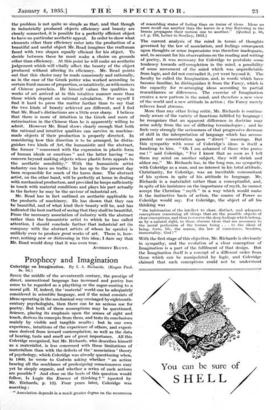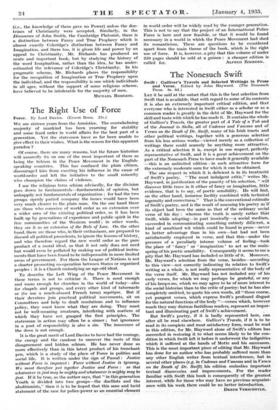Prophecy and Imagination
SINCE the middle of the seventeenth century, the prestige of direct, unemotional language has increased and poetry has come to be regarded as a plaything or the sugar-coating to a moral pill. If, indeed, the `material' world can be adeqUately considered in scientific language, and if the mind consists of ideas operating in the mechanical way envisaged by eighteenth- century psychologists, then there can be no serious use for poetry. But both of these assumptions may be questioned. Science, placing its emphasis upon the senses of sight and touch, derives its concepts from them, and tests its conclusions mainly by visible and tangible results ; but in our own experienct, intuitions of the experience of others, and experi- ence derived from inward contemplation, as well as the data of hearing, taste and smell are of great importance. All this Coleridge recognized, but Mr. Richards, who describes himself as a materialist, is less concerned with these limitations of materialism than with the defects of the association ' theory of psychology, which Coleridge was already questioning when, in 1800, he wrote to Godwin asking whether " an action bearing all the semblance of predesigning consciousness may yet be simply organic, and whether a series of such actions are possible ? And close on the heels of this question would follow, Is Logic the Essence of thinking ? " (quoted by Mr. Richards, p. 12). Four years later, Coleridge was asserting : Association depends in a much greater degree on the recurrence of resembling states of feeling than on trains of ideas. Ideas no more recall one another than the leaves in a tree fluttering in the breeze ,propagate their motion one to another." (Quoted p. 68, c.f. p. 168, Letter to Southey, 1803.) The current analysis of the mind in terms of thoughts governed by the law of association, and feelings consequent upon thoughts or sense impressions was therefore inadequate, and, to account for his observations on the reading and writing of poetry, it was necessary for Coleridge to postulate some tendency towards self-completion in the mind, a possibility of some movement of the mind which was unpredictable from logic, and did not contradict it, yet went beyond it. The faculty he called the Imagination, and, in words which have become familiar, he distinguishes it from the Fancy, which is the capacity for re-arranging ideas according to partial resemblances or differences. The exercise of Imagination creates a new pattern in the mind, and therefore a new view of the world and a new attitude in action ; the Fancy merely relieves local stresses.
More than any other living critic, Mr. Richards is continu- ously aware of the variety of functions fulfilled by language': he recognizes that an apparent difference in doctrine may arise solely from the use of differing terminologies ; and he feels very strongly the seriousness of that progressive decrease of skill in the interpretation of language which has accom- panied our concentration upon " direct " meanings. But this sympathy with some of Coleridge's ideas is itself a handicap to him. " Oh I am ashamed of those who praise me ! " said Coleridge, " For I know that as soon as I tell them my mind on another subject, they will shrink and abhor me." Mr. Richards has, in the long run, no sympathy with Coleridge as a man, and no interest in his total attitude. Christianity, for Coleridge, was an inevitable concomitant of his system in spite of his attitude to language. Mr. Richards is a materialist rather than a conceptualist, and, in spite of his insistence on the importance of myth, he cannot accept the Christian " myth " in a way which would make it the instinctive basis of action, the source of Power as Coleridge would say. For Coleridge, the object of all his thinking was
" the habituation of the intellect to clear, distinct, and adequate conceptions concerning all things that are the possible objects of clear conceptions, and thus to reserve the deep feelings which belong, as by a natural right, to those obscure ideas that are necessary to the moral perfection of the human being . . . to the ideas of being, form, life, the reason, the law of conscience, freedom, immortality, God ! "
With the first stage of this objective, Mr. Richards is obviously in sympathy, and the evolution of a clear conception of' Tmagination is a part of the fulfilment of that design. But the Imagination itself is a concept of a different order from those which can be manipulated by logic, and Coleridge claimed that such conceptions could not be understood (i.e., the knowledge of them gave no Power) unless the doc- trines of Christianity were accepted. Similarly, in the Discourses of John Smith, the Cambridge Platonist, there is a distinction between Fancy and True Prophecy which is almost exactly Coleridge's distinction between Fancy and Imagination, and there too, it is given life and power by an appeal to Christianity. Mr. Richards has produced an acute and important book, but by studying the history of the word Imagination, rather than the idea, he has under- estimated the relevance of Coleridge's Christianity. In his pragmatic scheme, Mr. Richards places the responsibility for the recognition of Imagination or True Prophecy upon the individual, and the responsibility is one which individuals in all ages, without the support of some religious scheme, have believed to be intolerable for the majority of men.
MICIIAEL Rowans.







































 Previous page
Previous page